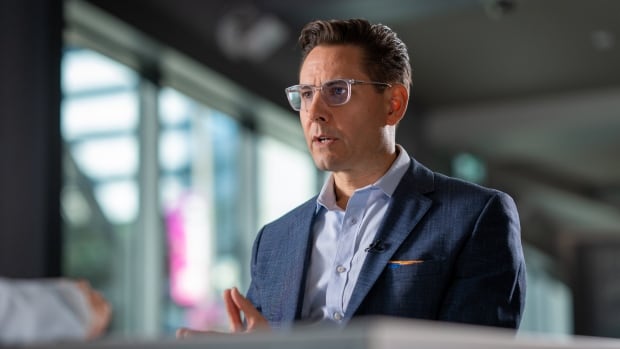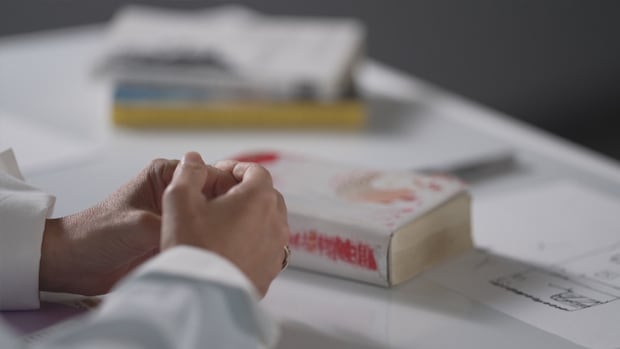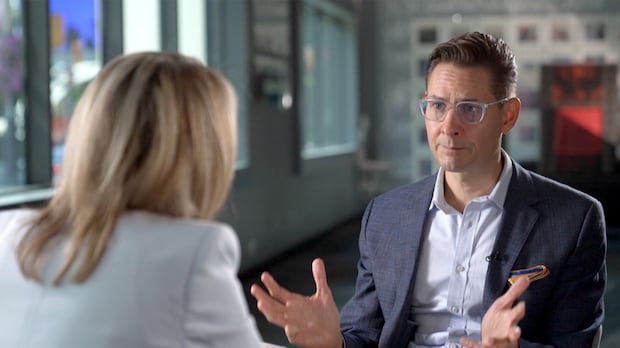On the evening of December 10, 2018, Michael Kovrig was out for dinner in Beijing with his six-months-pregnant partner, unaware it was the last time he’d enjoy her company for more than two and a half years.
Strolling home, the couple climbed a spiral staircase in front of his apartment building.
“And boom … I come out of the stairs and there’s a dozen men in black, cameras on them, dressed identically, but no … markings, no badges, no nothing, surrounding us, shouting in Chinese, ‘That’s him,'” he told CBC News Chief Correspondent Adrienne Arsenault in an exclusive interview airing Monday.
He said a woman stepped forward and held up a piece of paper he wasn’t given a chance to read.
“Apparently in Chinese it had a warrant for my arrest on it,” he said. “They grabbed me. They grabbed my phone so I couldn’t make a call. They pinned my arms.”
The men pulled his partner away from him. His number one concern, he said, was her safety and the safety of their unborn child.
Michael Kovrig, a former Canadian diplomat, tells CBC News chief correspondent Adrienne Arsenault about the moment he was apprehended in Beijing in 2018 on his way home from dinner with his pregnant partner. It would be nearly three years before he was freed from detention.
Kovrig said the men pushed him toward three black SUVs parked nearby. He was shoved into a back seat between two men in black. They slipped a blindfold over his face and cuffed his hands.
“Most of us, fortunately, don’t have to experience what it’s like being handcuffed. It’s right away imposing another identity on you … my mind went very quiet,” he said.
Looking down, he could just make out his watch. For 45 minutes he counted turns — right, then right again — and calculated he was headed somewhere in South Beijing.
The car eventually slowed, he heard the crunch of gravel under the tires, a gate opening and dogs barking. A few minutes later, he was taken out of the car and into an underground parking garage, then into an elevator and eventually an office.
They sat him in a hard chair and pulled the blindfold away. When his eyes adjusted to the light, he saw an elderly Chinese man sitting across from him wearing thick glasses.
“I’m trying to control myself and not panic … I decided very quickly that there was no benefit to … shouting, screaming, any of that … so I asked what this was all about,” Kovrig told CBC News.
He was told that he was under suspicion of endangering China’s state security and that he would be interrogated.
“A chill went down my spine,” he said. “That was not a good moment.”
‘Relentless interrogation’
He was taken down the hall to a padded cell. There was a bunk in the corner. Two plainsclothes guards shut a thick door with a magnetic lock.
“That room was essentially my universe for almost six months. That room and the room across the hall, which was the interrogation room,” he said.
The windows to his padded cell were blacked out and fluorescent lights stayed on 24 hours a day.
“It was psychologically, absolutely, the most gruelling, painful thing I’ve ever been through,” he said. “It’s a combination of … total isolation and relentless interrogation for six to nine hours every day, on and on and on.”
Michael Kovrig, a former Canadian diplomat who was held in China for nearly three years, tells CBC News chief correspondent Adrienne Arsenault about the interrogation he endured during his six months in solitary confinement. ‘They are trying to bully and torment and terrorize and coerce you’ into believing you’re guilty, even though you’re not, he says.
“They are trying to bully and torment and terrorize and coerce you … into accepting their false version of reality, in which you’re guilty.
“And the only way to save yourself is to grovel, throw yourself on their mercy, beg for forgiveness, apologize and confess.
“The United Nations standard is no more than 15 days in solitary confinement. More than that is considered psychological torture. I was there for nearly six months.”
The torture, he said, was psychological, not physical.
On December 14, four days after he was taken into custody, Kovrig got his first consular visit with Canada’s then-ambassador John McCallum and another official from the embassy an an offsite location.
Kovrig said he remembers trying, in that meeting and others, to communicate that China was violating international law by interrogating him they way they were.
Kovrig said that in those initial months he cycled through feelings of anguish, grief, humiliation, shame and guilt over the trouble his detention might be causing his family.
He said his food rations were cut for being uncooperative. He said that during interrogations he was put in a high-backed wooden chair and restrained, forbidden from crossing his legs or changing his position.
“I realized what I had to do was somehow find iron discipline and take back control of my own mind and my own time, ” he said. “So I started following a set of practices, and basically I created a schedule for myself also to have a sense of time.”
Kovrig said he would start the day with yoga, followed by meditation that he would do while walking, seated or lying down.
“They didn’t leave me undisturbed after half an hour, so there would be something happening. I had to stop,” he said.
Teaching himself Chinese in prison
Kovrig said that as the months passed, he decided his crisis was also Canada’s crisis, that Canada’s foreign policy was “in a deep freeze” because of his detention.
“I decided that I need to be the best detainee I can be. I need to demonstrate that they’re not breaking me, that you know, that they’re not crushing me,” he said.
In May of the following year Kovrig, and Michael Spavor, another Canadian who had also been detained but was being held separately, were formally arrested. CBC reported news of the charges on May 16, 2019.
Kovrig left his cell and was transferred to a pre-trial detention facility.
Michael Kovrig, a former Canadian diplomat who was held in China for nearly three years, says he coped with his detention by working on his Chinese language skills. In an interview with CBC News chief correspondent Adrienne Arsenault, he explains why it helped to think of himself as a ‘student of Chinese.’
“That was kind of like moving from hell to limbo,” he said. “If I’d gone straight into the detention centre, it would have seemed horrible. But after solitary confinement, it was a big improvement.”
Kovrig spent the following two years in that facility. This time he had cellmates, daylight through Plexiglass windows and room to walk around.
To survive, he said, he decided to “invert the equation” by studying a Chinese/English dictionary and working through Chinese language books, hour by hour, between interrogations, to improve his knowledge of the language.
‘The Canadian government was not prepared’
On September 25, 2021, Kovrig and Spavor landed in Calgary shortly before 8 a.m. ET on a Saturday aboard a Royal Canadian Air Force Challenger aircraft.
The two men had been illegally detained by China in apparent retaliation for the Vancouver arrest of Huawei’s chief financial officer, Meng Wanzhou, who was detained at the behest of the U.S. to face fraud charges related to American sanctions against Iran.
The two men cleared Chinese airspace just hours after the extradition case against her was dropped.
Kovrig told CBC News that Canada needs to be better prepared and have a strategy in place if it is going to be making arrests or other moves that would anger a country like China.
“For a number of reasons, the Canadian government was not prepared. The U.S. government wasn’t prepared for the blowback from arresting Meng Wanzhou, and so it took them a long time to figure out what to do,” he said.
“I think eventually they figured out the right path. They put a lot of really qualified, competent, driven people on it, so I don’t fault the effort involved,” he said. “But in a number of ways, I think somewhat different approaches and a quicker understanding of the problems would have led to hopefully a faster resolution.”
Kovrig’s partner had played their daughter recordings of his voice and showed pictures of her father while he was locked up on the other side of the world. Their daughter was two-and-a-half years old when he finally arrived back in Canada.
“So she immediately knew I was Daddy,” he said. “And within the first few hours, we were happily playing together.”
The day after his release, the three of them went for a walk in a park with their dog. He remembers a day flooded with sunshine, with green trees and lush flowers.
“I’ll never forget that sense of wonder, of everything being new and wonderful again and pushing my daughter on a swing that had her saying to her mother, ‘Mummy, I’m so happy.'”
‘I’ll never forget that sense of wonder,’ Michael Kovrig, a former Canadian diplomat who was held in China for nearly three years, tells CBC News chief correspondent Adrienne Arsenault.





